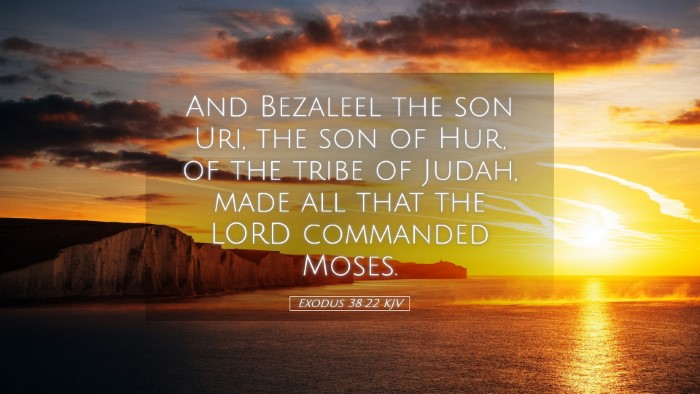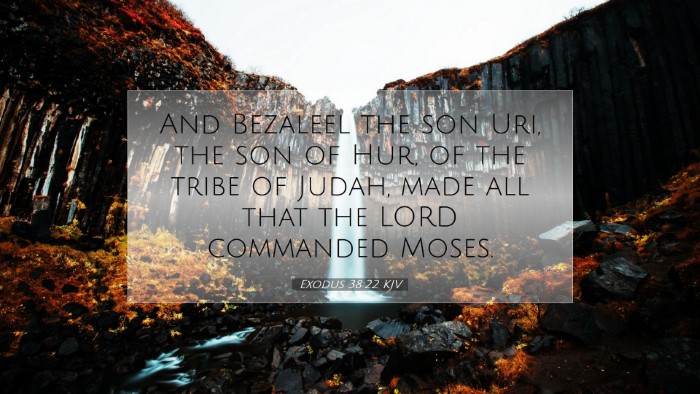Exodus 38:22 Commentary
Verse: "And Bezaleel, the son of Uri, the son of Hur, of the tribe of Judah, made all that the Lord commanded Moses."
Introduction
The mention of Bezaleel signifies the Lord's provision of skilled artisans capable of executing His divine plans. This verse encapsulates the essence of divine obedience and craftsmanship. Through Bezaleel's actions, God demonstrates how He equips individuals for specific tasks within His sanctuary.
Contextual Background
This passage is situated within the larger narrative that describes the construction of the Tabernacle, the dwelling place for God's presence among His people. Exodus 25-31 outlines God's instructions to Moses for building the Tabernacle, while Exodus 35-40 details its actual construction. Bezaleel represents the faithful execution of God’s commands.
Commentary Insights
1. The Role of Bezaleel
Matthew Henry: Henry emphasizes Bezaleel's prominent role, noting that he was filled with the Spirit of God in wisdom, understanding, knowledge, and all manner of workmanship (Ex. 31:3). He was not only a craftsman but divinely appointed for this sacred task, indicative of God’s empowerment for the work of the ministry.
Albert Barnes: Barnes highlights that Bezaleel’s lineage is significant, tracing back to Judah. This reflects God’s choice from a royal tribe, underscoring that divine craftsmanship transcends mere skill; it is inherent to the God-given identity of His people. The tribe of Judah, representing praise, indicates that the work done for God must emanate from a heart of worship.
2. Divine Commands and Human Obedience
Adam Clarke: Clarke draws attention to the phrase "all that the Lord commanded Moses." This reiterates the theme of meticulous obedience to God’s directives. Clarke suggests that Moses, as the mediator, relayed God's instructions, and Bezaleel's compliance reflects the ideal relationship between divine command and human action. Every detail observed in the construction became a testament to the church’s commitment to God's covenant.
3. The Spirit’s Empowerment
Both Henry and Barnes observe that the filling of the Spirit empowers Bezaleel. This empowerment not only equips him for the practical aspects of construction but symbolizes the broader principle that God equips His chosen for specific purposes. Henry links this empowerment to the New Testament promise of the Holy Spirit, encouraging believers to remain sensitive to the Spirit's directive in their own lives.
4. Implications for Leadership
This verse carries important implications for leadership in the church today. Pastors and church leaders can draw from Bezaleel’s example of obedient service, recognizing that effective leadership combines divine calling and human response. The church must foster a culture that encourages individuals to discover and utilize their God-given talents.
5. The Importance of Skill in Worship
Henry emphasizes that skillful workmanship in worship settings honors God. The Tabernacle's beauty and function reflected the glory of God and the care taken in its construction should inspire contemporary worship contexts. The integration of artistry and faithfulness in church ministry can still reflect God’s character and excellence.
Theological Reflections
Bezaleel’s dedication serves as a reminder of the sacredness of the tasks undertaken in the service of God. All believers are called to use their gifts—whether in teaching, administration, or the arts—to contribute to the life of the church.
1. Community Collaboration
This verse illustrates the collaborative nature of community in fulfilling God’s purposes. Just as Bezaleel didn’t work in isolation, the church is called to work together, binding individual skills into a cohesive effort to glorify God.
2. Trusting God’s Provision
As scholars reflect on this passage, an underlying theme emerges: trusting in God’s provision. Leaders and members must be assured that God equips those He calls and that reliance on His wisdom is essential for undertaking His work.
Conclusion
Exodus 38:22 highlights the intersection of divine command and human obedience. Bezaleel becomes an archetype of faithfulness, creativity, and the Spirit's empowering presence in the acts of service. The implications extend far beyond the physical construction of the Tabernacle; they invite all believers to engage with their gifts, empowered by the Holy Spirit, and to glorify God through their works.


